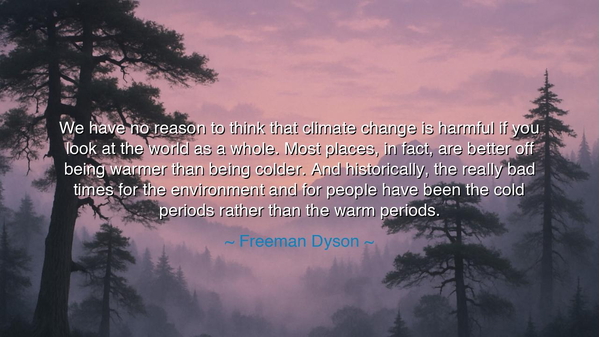
We have no reason to think that climate change is harmful if you
We have no reason to think that climate change is harmful if you look at the world as a whole. Most places, in fact, are better off being warmer than being colder. And historically, the really bad times for the environment and for people have been the cold periods rather than the warm periods.






When Freeman Dyson declared, “We have no reason to think that climate change is harmful if you look at the world as a whole. Most places, in fact, are better off being warmer than being colder. And historically, the really bad times for the environment and for people have been the cold periods rather than the warm periods,” he spoke as a man both scientist and philosopher—one who gazed upon the vast history of the Earth and saw patterns that transcended the fears of his age. His words were not a denial of danger, but a reminder of perspective. Dyson sought to awaken the human mind from panic into reflection, to remind us that nature’s story is long and cyclical, and that warmth and cold, growth and decline, are the eternal rhythms of creation.
In the ancient manner of thinkers, Dyson invites us to look beyond the hour and into the age. For he understood that the Earth has known ice and fire, flood and famine, and through each upheaval, life has adapted and renewed itself. He saw in warmth not only threat but possibility: fertile lands where once there was frost, open seas where once there was ice, new migrations, new balances. To him, the lesson was not that warmth is good and cold evil, but that life thrives on change, and that the human spirit, when humble and wise, can endure any season. His was the vision of a sage who refused to worship fear, even when the crowd trembled.
History lends truth to his observation. In the age of the Little Ice Age, from the 14th to the 19th centuries, Europe was struck by famines, failed harvests, and plague. Rivers froze, fields died, and empires weakened under the weight of hunger. Yet in warmer eras—the Medieval Warm Period, for example—civilizations flourished. Crops spread northward, trade expanded, cathedrals rose, and mankind’s confidence in progress rekindled. Dyson saw in these cycles a simple, powerful truth: warmth gives life, while unrelenting cold constrains it. To him, this was not cause for arrogance, but for gratitude—and for the recognition that our world, ever dynamic, cannot be reduced to one emotion of fear or guilt.
But Dyson’s wisdom reaches beyond climate—it speaks of how humans relate to uncertainty itself. The ancient Stoics taught that the wise man must not despair at what he cannot control, but instead learn to live harmoniously with nature’s unfolding. Dyson echoed this philosophy in modern tongue. He challenged his generation to think not with anxiety, but with courage—to study the Earth as a living, breathing system, not as a fragile glass orb doomed to shatter. His faith was not blind optimism; it was the confidence of a mind that saw adaptation as humanity’s greatest strength. “We are builders,” his philosophy seems to whisper. “Not victims of change, but participants in it.”
Still, his words stirred controversy, for many feared they diminished the urgency of environmental care. Yet in truth, Dyson’s message was not to ignore the planet’s cry, but to see it whole. To love the Earth is not to fear its every tremor; it is to understand its ancient resilience. The Earth has endured fires greater than our industries and floods beyond our imagining, and still she breathes, still she heals. The lesson Dyson wished to plant was one of balance—that wisdom lies not in panic or indifference, but in reverence informed by reason. For the man who sees only disaster cannot build; the man who sees only comfort cannot act.
Think, then, of the farmers of the Nile, who through countless centuries learned to read the floods and sow in rhythm with the river. They did not curse the waters nor worship them blindly; they adapted, turning chaos into abundance. So must modern humanity learn to stand in this same posture—neither trembling before change nor defying it in hubris. Dyson’s teaching calls us to meet the future not as frightened children, but as stewards and learners, guided by the lamp of science and the humility of history.
Let the final lesson be this: Truth is rarely born from extremes. The wise must learn to see both sides of nature’s coin, to understand that what seems peril in one age may be blessing in another. Do not let fear harden your heart against the possibilities of change. Instead, observe, learn, and prepare with courage. For the Earth, like the soul, passes through winters and springs alike, and only those who accept both can truly thrive. As Dyson’s words remind us, the world’s warmth may test us, but it may also renew us—and in that renewal lies not destruction, but the promise of resilience, the quiet, enduring song of life itself.






AAdministratorAdministrator
Welcome, honored guests. Please leave a comment, we will respond soon